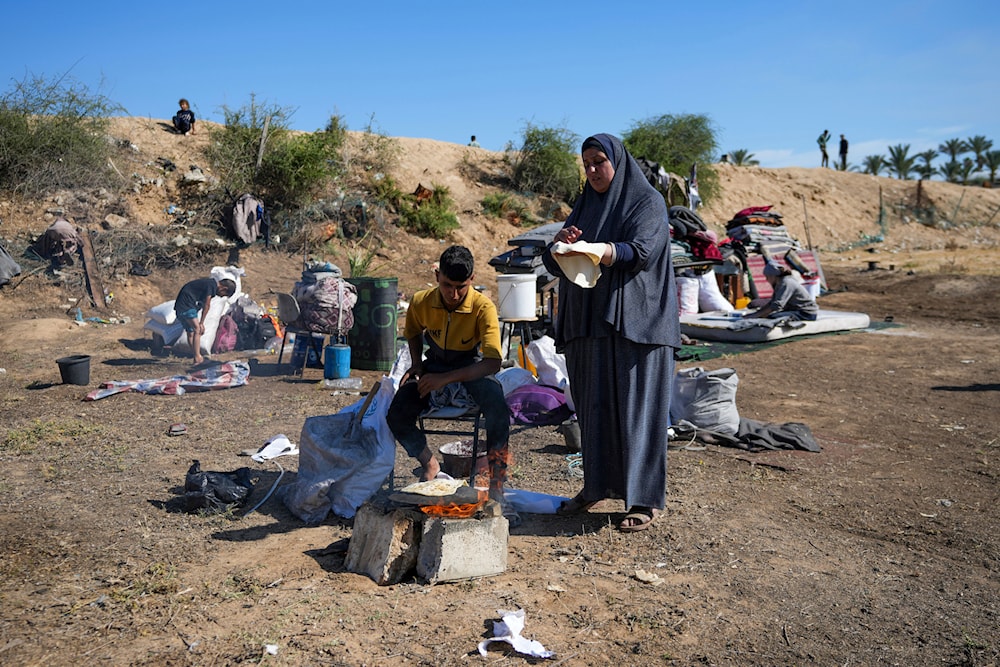UN stops all food distribution in Rafah, warns of US pier failure
The World Food Programme spokesperson says the agency stopped all distributions in Rafah after exhausting its stock.
-

Displaced Palestinians arrive in central Gaza after fleeing from the southern Gaza city of Rafah in Deir al-Balah, Gaza Strip, on Wednesday, May 7, 2024. (AP)
The UN stopped food distribution in the southern Gaza city of Rafah on May 21 due to a lack of supplies and an untenable security situation as a result of the Israeli expansion of a military operation in Rafah.
The UN warned that humanitarian operations all around the territory were near collapse.
🛑As a result of the ongoing military operation in eastern Rafah the @UNRWA distribution centre and @WFP warehouse, both in #Rafah, are now inaccessible.
— UNRWA (@UNRWA) May 21, 2024
Food distributions in Rafah, southern📍#Gaza, are currently suspended due to lack of supplies and insecurity. pic.twitter.com/EQfdjHYwrk
According to the Associated Press, UN spokesperson Stephane Dujarric said the UNRWA distribution center and the WFP’s warehouses in Rafah were "inaccessible due to ongoing military operations."
It added that when Dujarric was asked about the ramifications of this suspension, he said, "People don’t eat."
As for the UN World Food Programme (WFP), a spokesperson, Abeer Etefa, as reported by AP, also warned that "humanitarian operations in Gaza are near collapse."
She said that if the delivery of food and other supplies into Gaza does not continue "in massive quantities, famine-like conditions will spread."
The spokesperson also said that WFP has also halted distribution in Rafah after exhausting its stocks.
Even though the WFP is still giving out hot meals and "limited distributions" of reduced food parcels in central Gaza, Etefa said that "food parcel stocks will run out within days."
Failed US pier
No aid trucks have entered the territory in the past two days via a floating pier set up by the US for sea deliveries, warning that the $320m (£250m) project may fail unless "Israel" begins permitting the conditions humanitarian groups need to operate safely, the UN said.
The US launched a floating pier on the Gaza coast, claiming it was a possible route for accelerated deliveries.
On May 17, the first 10 trucks rolled off a ship toward the pier and were moved to the WFP warehouse. No further deliveries came from the pier on May 19 or 20, according to Etefa.
"The responsibility of ensuring aid reaches those in need does not end at the crossings and other points of entry into Gaza – it extends throughout Gaza itself," she stressed.
WFP is re-evaluating logistics and security measures while also looking for alternate routes within Gaza, the spokesperson said, adding that it is working with the US Agency for International Development to coordinate delivery of food from the new US route.
Pentagon Press Secretary Major General Pat Ryder informed reporters in Washington that for the past few days, forward movement of aid from the pier was paused, but it continued on May 21, however, this was not confirmed by the UN.
The WFP has warned about this before
The United Nations World Food Programme (WFP) urged on May 17 for the opening of additional crossing points into the Gaza Strip, saying they are a lifeline for the Palestinians.
WFP warned that the escalation of IOF activity in Rafah risks stopping humanitarian operations in Gaza.
'Israel' closure of Gaza crossings 'completely crippling aid': UN
A top UN official said on May 9 that "Israel's" blockade of major crossings into Gaza has shut off the main entrance route for supplies, notably gasoline, making humanitarian operations nearly impossible.
Andrea De Domenico, head of the United Nations humanitarian agency (OCHA) in the occupied Palestinian territories expressed that the "main entry point for all humanitarian aid" had been lost.
Days before this announcement, the occupation closed the Karam Abu Salem/Kerem Shalom crossing following the killing of 4 Israeli soldiers in the Karam Abu Salem military base, which is around 1,5 km away from the crossing.
De Domenico told AFP that while "Israel" claims to have reopened Karam Abu Salem/Kerem Shalom on May 8, getting supplies in remains extremely difficult, adding that the Rafah gate, through which all petroleum into Gaza flows, remains blocked, implying that no fuel is entering.
"In Gaza, there are no stocks" of fuel, he stated, emphasizing that this meant "no movement."
"It is completely crippling the humanitarian operations."
WCK had to pause operations in Rafah
Moreover, "evacuation orders in Rafah have forced several WCK-supported community kitchens to pause cooking," the World Central Kitchen (WCK) wrote in a statement released on May 8.
In their statement, the WCK said, "Our field kitchens and community kitchens outside evacuation zones provided more than 168,000 meals in communities around Rafah and Deir al-Balah."
Evacuation orders in Rafah have forced several WCK-supported community kitchens to pause cooking today. Still, our field kitchens and community kitchens outside evacuation zones provided more than 168,000 meals in communities around Rafah and Deir al-Balah.#ChefsForGaza pic.twitter.com/F420P15JMT
— World Central Kitchen (@WCKitchen) May 7, 2024
Read more: Majority of Rafah children injured, malnourished, traumatized: UN

 4 Min Read
4 Min Read








